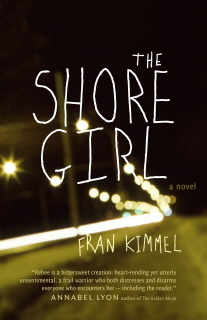 Annie Vigna
Annie Vigna
a review of
The Shore Girl
By Fran Kimmel
NeWest Press, 2012
ISBN 9781927063170
$19.95
I haven’t finished reading the first page of this novel and already “my eyes are wet” (9). Fran Kimmel has managed to unhinge my emotions in only five short paragraphs. I sense I’m in for an unforgettable, uncomfortable reading experience. Annabel Lyon, author of The Golden Mean, was right when she said, “Rebee is a bittersweet creation: heart-rending yet utterly unsentimental, a frail warrior who both distresses and disarms everyone who encounters her — including the reader.”
Kimmel’s language is precise and lacks any affectation, not even in tender moments. The Shore Girl is Rebee — Rebee Shore.
The hope in his voice brought a lump to my throat that tasted like warm honey. . . [b]ut that’s the thing isn’t it. Hope has soft edges. Only after does it cut you to shreds. When he found us at the campground, I was so bloated with it I thought I might burst. Mile after mile I thought about him, about the man named Jake, about the man who was my father (179).
Kimmel has created realistic characters, characters who resonate with the reader–people we have met, either in real life or in news reports: real, raw, hurting, coping, failing, surviving characters. Each character is created to tease out the essence of Rebee. It’s as if Rebee is a composition of patches being sewn painstakingly onto a quilt. It is her story from a frightened four-year old to a self-sufficient twenty-one year old woman.
The female characters are marred, scarred, dealing with their own particular demons; still, the author uses them artfully. Miss Bel, Rebee’s grade two teacher, tries desperately to insinuate her kindness and understanding into Rebee’s life; but perhaps her own troubled psyche renders her an obstacle, rather than any solution. Nevertheless, Miss Bel gives Rebee the Wintergreen Lifesavers light show, the magic of which remains with Rebee. Aunt Vic, Harmony’s sister, is incapable of influencing Rebee’s life in a positive way; however, her boyfriend Eddy brings a little hope until Aunt Vic’s tyranny drives him away.
The greatest female influence on Rebee is her mother Harmony. There is such an appreciation and love of this woman by the girl that only highly emotional language would suffice to describe this. The author does not stoop to sentimentality; instead, she has Rebee say, “I can tell you now that I’m all grown up, that I don’t need a mother to keep me safe. That might be a lie. Sometimes, in the middle of the night, I stand at her window, and I think I see her haunted eyes staring back at me” (177).
Rebee is strong, much stronger than the two male characters that remain at the end of the novel.
Jake, a man’s man, has a heart of gold, and though he is so broken, physically, having fallen off an oil rig in Kenya, he feels a palpable tenderness towards the two “girls” (Rebee, age 12, and her mother, Harmony) he encounters at his fishing spot. He thinks of Rebee, “This kid needed homemade chicken noodle soup in the worst way” (90). However, he realizes that Harmony “was not exactly needy” (100). Jake longed for a wife and family, a lasting relationship:
I thought about the men in this world who settle next to the rhythm of a woman, one woman, their whole lives . . . I’m a believer. I just don’t know how it’s done is all. What kind of chromosomes, hormones, cyclones bring all that together? Do you fall hard for a woman because of the light in her hair? The look she gets when she’s looking at you? And if you fall for one reason do you stay for another, until there comes a time when you can’t remember why you fell in the first place but you don’t even notice because it no longer matters. Somewhere between your falling and landing, what floats in between? What anchor drops to hold a man steady (97)?
Perhaps his longing scares the ever-vigilant Harmony away.
Joey is the other male character that endures. Through parallels drawn between the lives and circumstances of Rebee and this strange, skinny, pukey, pubescent boy, the author reveals Rebee’s history. Furthermore, the author allows Rebee to express her feelings of longing for a regular life when she says to Joey,
Every kid without a dad makes up stuff about a dad.
We met a man at a campground once. There was snow.
He took Harmony for a drive in the middle of the night.
Joey: And not you?
Afterwards, I made up stuff. I might have pretended he was my father.
Joey: Well, at least he brought your mom back. Obviously. That was good.
Were you scared?
Maybe a little. Not so much. Not when he took her away. Just when he brought her back and everything stayed the same (145).
The Shore Girl is a novel that continues to haunt well after it’s finished. Congratulations to Fran Kimmel for writing this novel, her first. Fran graduated from the University of Calgary with a degree in Sociology. She has been a youth worker, and a career counselor. Her stories have appeared in literary journals across Canada and have twice been nominated for the Journey Prize. Fran lives with her husband in Lacombe.
This review appears in FreeFall Volume XXIII Number 2 Spring / Summer 2013

